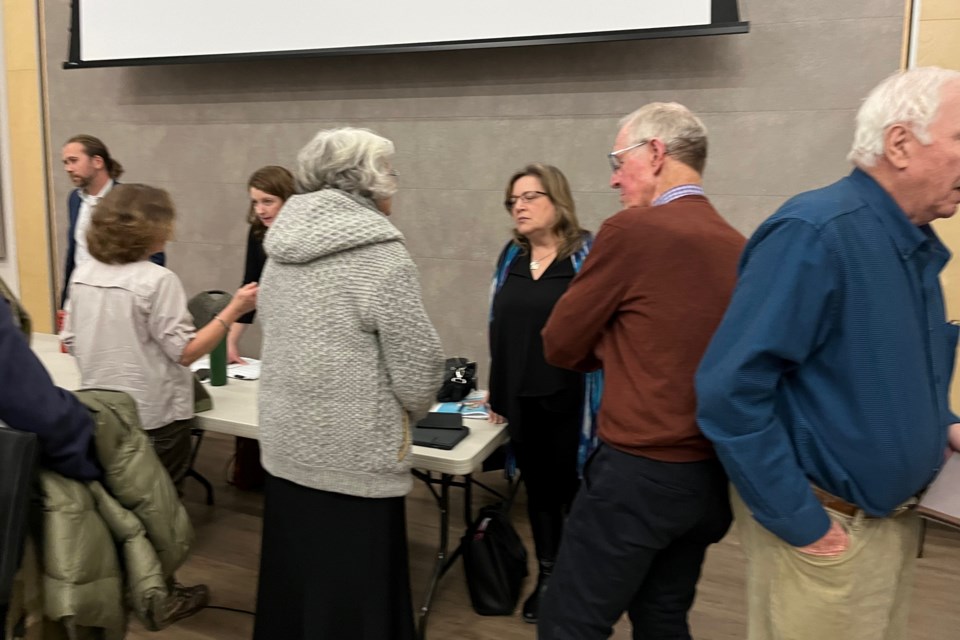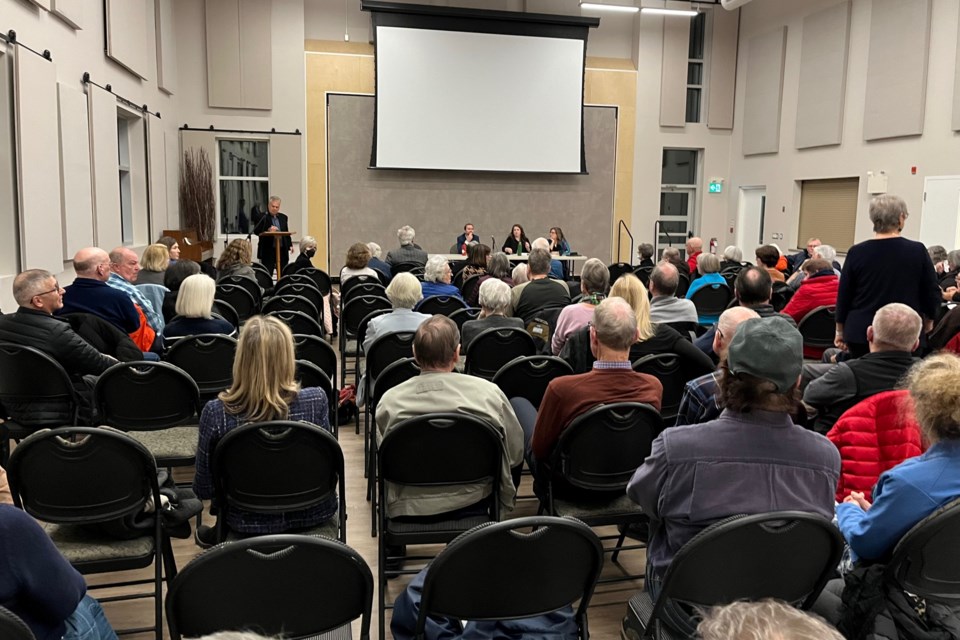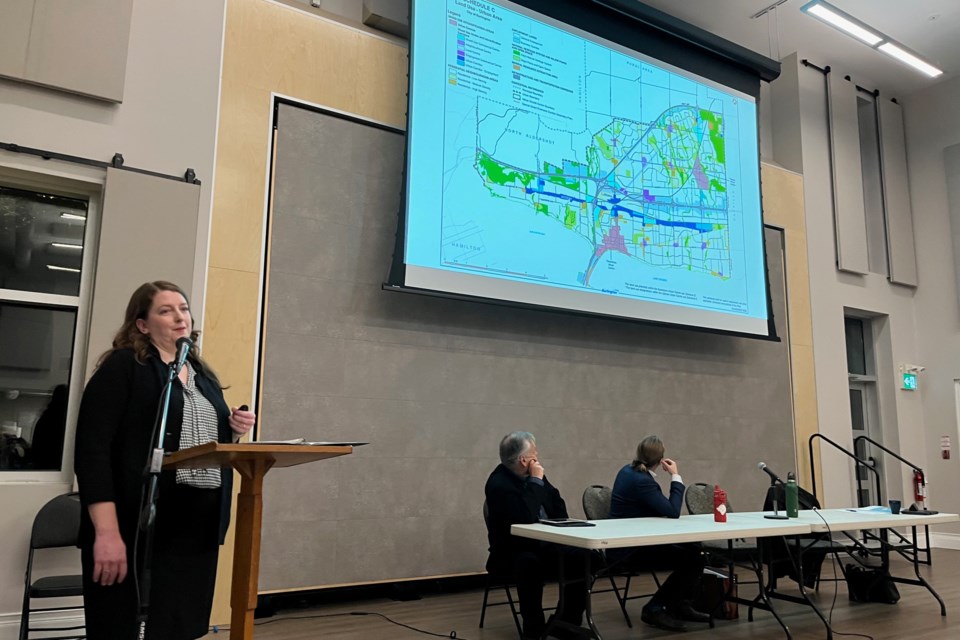It’s going to take a coordinated effort and some patience to get to 29,000 homes by 2031.
Port Nelson United Church, the Roseland Community Organization and the Roseland Park Country Club recently presented a three-part speaker series highlighting issues of interest and concern to residents of the Roseland neighbourhood and the wider Burlington community.
From health care to climate change to housing, the needs and opportunities in the community the series presented different perspectives about issues, policies, local implementation and constraints to action.
The final public event, for the season, was held Monday night at Port Nelson United Church on the topic of housing. The panel consisted of Ward 4 councillor and deputy mayor of housing, Shawna Stolte; project manager for the City of Burlington’s Official Plan, Alison Enns; and CEO of the West End Home Builders’ Association, Mike Collins-Williams.
‘How do we get to 29,000?’ was the title of the session and all three panellists explained that the task will require a coordinated effort, a reduction in ‘red tape’ at the city level, and a deeper understanding and amount of patience on the part of residents.
Enns stated that the policies and regulations coming from the province and federal governments are constantly changing, some at a moment's notice, and challenging for cities to adapt to, let alone expecting the public to keep abreast of what is current.
“The city approved in 2022 its housing strategy,” said Enns. “It established a road map in order to start taking incremental steps to meeting the needs of the community today and for the people who are going to move here in the future. Everyone is welcome to Burlington and that means we have to change the type of housing that we have available.”
Enns explained, “The city doesn’t create housing. The city builds frameworks, and processes guided by provincial, federal and other legislation. In mid-2022 there were 23,000 housing units in the city’s development pipeline – anything from initial thoughts of what might happen to something closer to shovels in the ground. The number now is 42,000 units (51.3 per cent are in the pre-application stage, only 12 per cent are at the planning approval stage).”
Enns also pointed out the province’s recent rules allowing all residential areas in municipalities to accept applications for three units per what was considered single-family lots. The federal government’s condition for a recent $21 million ‘Housing Accelerator Fund’ grant bumped that number up to four.
Many among the 100 attendees at the session voiced their concerns about living next to a four-plex construction.
Everyone on the panel tried to stress that neighbourhoods would not suddenly be  overrun with three or four units on every lot. Still, Burlington must embrace new housing on an in-fill basis rather than continuing to build on greenspace as it has in the past.
overrun with three or four units on every lot. Still, Burlington must embrace new housing on an in-fill basis rather than continuing to build on greenspace as it has in the past.
Collins-Williams, himself a designated planner, noted, “Cities are constantly changing, constantly evolving. We have a lot of existing communities in Burlington that haven’t changed a lot in terms of the built form, but the average number of people per household is declining We have an aging population, declining school enrolments and those neighbourhoods are becoming more and more expensive, less attainable, and they’re not attracting families.”
He noted that concerns about infrastructure are misunderstood because decades ago, those neighbourhoods were built to service larger families that can still accommodate in-fill.
Both Enns and Stolte pointed to the increase in high-rise development planned around Major Transit Station Areas (MTSA) like the three GO stations.
Stolte acknowledged that the most expensive part of development is often the cost of land to build on. “What we (the city) can do is find opportunities like purchasing land, like working with partners who have excess land, like getting through some of that red tape,” she said.
Working with the school boards, church organizations, and even private entities that own underused lands are possibilities for partnerships. Stolte also mentioned city initiatives such as the Burlington Lands Partnership committee and the Pipeline-to-Permit committee, both hoping to expedite development.
Collins-Williams spoke on the ‘risks’ that developers in his organization face when approaching cities like Burlington with residential development plans. “In Burlington, one of the biggest costs is taxes and development charges,” he said. “Statistics Canada released a study that identified an increase in average construction costs for residential units of 54 per cent (since 2019),” he added.
Stolte, whose ward encompasses the Roseland district, spoke of her experience as a family mediator and the fact that negotiations, “Might not be exactly what each party wants, but each party’s getting enough of what they need in order to make it work. That’s what council’s job is. That’s what my job is. And the part that is very critical (when it comes to the housing issue) is you guys, the community. We need to make this work for you who may have lived here for a year or 50 years.”
Questions about affordable, or attainable, housing were also raised.
“Whether it is affordable housing or not, that depends on all three levels of government and the industry being able to come together in a partnership,” said Collins-Williams. “But in the long-run I think that Burlington’s going to continue to grow and there will continue to be investment in the city.”
Stolte spoke after the event about her vision to hold a housing symposium for the whole city. “Unfortunately, far too many people don’t understand the challenges, and what we’re trying to achieve, things that we talked about at this session,” said Stolte. “Change is coming, but how do we get to those underlying interests of the community, what does the building industry need, what do city staff need, what does City Council need to come up with solutions that will work for everybody?”




